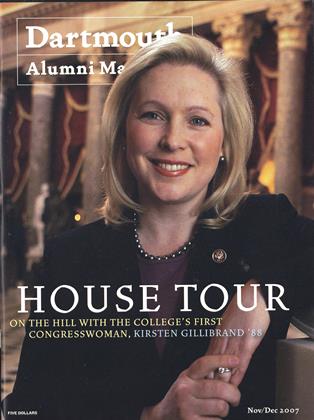MedImmune's CEO on drug development and serving patients
"As a society we have some verytough choices to make about whatis good-enough health care. What ever ever system we put into place has to assure that we have both expanded access and the best care, not one or the other. In the United States we haven't been forced to make those decisions. We've expected the best to be given to us. I don't think we can afford that much longer."
"A lot of people in our industry aresurprised I'm not out of a scientificor medical background, but I'venever found a lack of formal trainingto be an impediment. The College did what a good liberal arts college is supposed to do—not teach me specific facts and information but teach me how to learn, not to be scared off by any topic but drawn in by things that are intellectually challenging.
"I'm fortunate to have had a classic entrepreneurial experienceat Medlmmune. I was given the opportunity to run virtually every department—usually right after it had blown up—so I could fix it."
"When it comes to drug safety, people are at full attentionright now, both within the pharmaceutical industry and at the FDA. In an election year there is something of a feeding frenzy that is not as sciencebased a dialogue as it should be. Ultimately, that's not in the best interest of patients, the FDA or the drug companies."
"The FDA is in a very difficult position right nowwith the press, Capitol Hill and the industrychewing on it at the same time. It's no healthy that pharmaceutical industry fees pay well over half of the FDA's drug-review budget, but that's only because Congress was failing to appropriate adequate resources." J
"There is a lot of good that comes from independent, outside,clear-minded people asking tough questions, but pendulums swing, and some things we see now in terms of activist shareholder demands make me think the pendulum has reached its apex and needs to find more of a natural center."
"The cost of a drug's development and the longtime requiredto bring it to market is unsustainable—more than $1 billion a drug and more than 10 years to get it to patients. This results in companies having to charge the prices you see today—and the backlash you get to the pricing."
"There's an awful lot of data that suggest properly done direct-to-consumeradvertising is an extraordinarily effectivemethod of education to build awareness of medical interventionsand advances. I don't think the industry needs to apologize for sending some patients to their doctors to ask about new drugs. Our products save lives."
"Yes, we hear directly from patients. It varies a lot by disease state. There are some areas with highly organized patient-advocate groups that get quite involved."
"I disagree with those who say the Bush administration isanti-science. It deals with a lot of complex issues and not everyone agrees on them. The impact of an administration on the scientific agenda is modest."
"Countries that have universal health carearen't so convinced it's a great idea.""There's a misperception that the drug industryis somehow exploiting the Americanpeople by selling products at a lowerprice outside the United States than in theUnited States. What's really happening is that foreign governments, through price setting, are exploiting a U.S. public that demands medical innovation and new products. It's in the best interest of Americans for a company to get whatever it can elsewhere for a drug to defray the cost of additional research. If we arbitrarily fix the free market price in the United States we won't have research anymore."
"The concept of retirement is one I can't fathom A stressless environment is the process of I decay. I will always be pursuing something intensely and looking for challenges."
CAREER: President and CEO, Medlmmune Inc., a Gaithersburg, Maryland-headquartered biotech firm, since 2000; joined the company as vice president for business development, strategic planning and investor relations in 1992. Previously an investment banker with Smith Barney, New York, working first in real estate then health care and biotechnology NOTABLE ACHIEVEMENTS: Grew Medlmmune from 100 employees to more than 3,000; led its recent purchase by U.K.-based Astra Zeneca for $15.6 billion; manages Med Immune as global biologies unit of that corporation EDUCATION: A.B., economics and government FAMILY: Lives in Chevy Chase, Maryland, with wife Alice and four children
 View Full Issue
View Full Issue
More From This Issue
-
 Cover Story
Cover StoryClimbing the Hill
November | December 2007 By DIRK OLIN ’81 -
 Feature
FeatureDrug Buster
November | December 2007 By CHRISTOPHER S. WREN ’57 -
 Feature
FeatureThe Role Model
November | December 2007 By DAVID MCKAY WILSON -
 Feature
FeatureNotebook
November | December 2007 By JOHN SHERMAN -
 Feature
FeatureAlumni News
November | December 2007 By Kristin Brenneman '97 -
 ONLINE
ONLINENo Ordinary Joe
November | December 2007 By Jake Tapper ’91
Lisa Furlong
-
 Continuing Education
Continuing EducationBarry Sharpless '63: Dartmouth's Nobel laureate on the sweet smell of success
May/June 2002 By Lisa Furlong -
 Continuing Education
Continuing EducationWalter Lillienfield '19
May/June 2003 By Lisa Furlong -
 Continuing Ed
Continuing EdHoward Bad Hand ’73
July/August 2005 By Lisa Furlong -
 CONTINUING ED
CONTINUING EDDavid Shribman ’76
SEPTEMBER | OCTOBER 2018 By LISA FURLONG -
 CONTINUING ED
CONTINUING EDMichael Capuano ’73
MARCH|APRIL 2019 By LISA FURLONG -
 CONTINUING ED
CONTINUING EDAnn McLane Kuster ’78
SEPTEMBER | OCTOBER 2019 By LISA FURLONG
Continuing Ed
-
 Continuing Education
Continuing EducationBrad Ausmus '91
Mar/Apr 2003 By Lisa Furlong -
 Continuing Ed
Continuing EdFred Berthold Jr. ’45
Nov/Dec 2005 By Lisa Furlong -
 Continuing Ed
Continuing EdLeah Daughtry ’84
July/August 2006 By Lisa Furlong -
 Continuing Ed
Continuing EdMichele Hernandez ’89
Mar/Apr 2008 By Lisa Furlong -
 CONTINUING ED
CONTINUING EDDennis A. Dinan ’61
JULY | AUGUST 2019 By LISA FURLONG -
 CONTINUING ED
CONTINUING EDKIRSTEN GILLIBRAND '88
APRIL 2025 By Lisa Furlong

